The end of the Cold War led to the emergence of several areas of study that were somewhat muted in the era of superpower conflict, such as failed and fragile states, secession and climate change. In the post 9/11 era, the scope and depth of issues that are covered in IR courses has increased still further, as trans-national terrorism changed both the structure and perception of international politics. With almost all contemporary courses now addressing these modern dilemmas, a good book to navigate these issues will be of benefit for any student. Featured below are a small but select sample of books that delve into some of the most pressing issues facing us in the 21st Century.
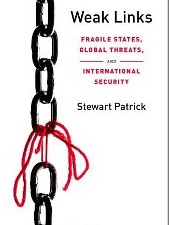 Stewart Patrick’s Weak Links: Fragile States, Global Threats, and International Security argues that the chief threats to security in the 21st Century are cross border threats emanating from unstable nations, rather than traditional military threats. The analysis is well structured and accessible, first offering an account of why a particular state may be fragile or failing, before moving forward to individual chapters addressing the implications for transnational terrorism, Weapons of Mass Destruction, transnational crime, energy insecurity, and the rise of cross border infectious disease.
Stewart Patrick’s Weak Links: Fragile States, Global Threats, and International Security argues that the chief threats to security in the 21st Century are cross border threats emanating from unstable nations, rather than traditional military threats. The analysis is well structured and accessible, first offering an account of why a particular state may be fragile or failing, before moving forward to individual chapters addressing the implications for transnational terrorism, Weapons of Mass Destruction, transnational crime, energy insecurity, and the rise of cross border infectious disease.
Patrick uses the general themes noted above to postulate which states the U.S should invest its time and resources in, noting that whilst genuine humanitarian efforts are to be applauded, basic strategic calculations will continue to dominate decisions on whether to intervene in a particular case.
It should be noted that this book, although global in its outward scope, is firmly US-Centric at its core and is clearly written for an American audience, and is institutionally sponsored by the Council on Foreign Relations (a North-Eastern US non-partisan think tank). The threats detailed by Patrick are generally referred to as threats to ‘the US and world security’ (or similar terminology); if you are looking for an analysis divorced from a pretext of American hegemony/primacy, you will need to look elsewhere. For Atlanticist students and scholars though, Weak Links will make for an interesting read and, although it probably should not be the first book you read on contemporary security issues due to the explicitly US-Centric focus, it is a solid text.
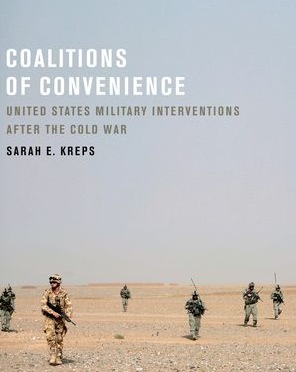 Students asking themselves why the post-Cold War global hegemon increasingly calls on support from other nations in its military engagements will benefit from reading Sarah E. Kreps’ Coalitions of Convenience: United States Military Interventions After the Cold War.
Students asking themselves why the post-Cold War global hegemon increasingly calls on support from other nations in its military engagements will benefit from reading Sarah E. Kreps’ Coalitions of Convenience: United States Military Interventions After the Cold War.
The analysis begins with twinned chapters, one of which explains the unipolar currents that drive modern warfare, and the second of which examines the same issues but focusing on multipolar emphases. These chapters provide a solid foundation on the subject at hand, and while a basic working knowledge of International Relations theory is necessary to appreciate the scope of the analysis offered, the book will be accessible to readers of all levels.
Having established the basis for her argument, Kreps then uses a series of case studies to trace the modern evolution of coalition building and multilateralism in various war efforts, as well as the evolution of the very idea of multilateralism itself. The case studies range from the 1991 Gulf War, through the 1994 Haiti intervention, and end with the dual battlefields of Afghanistan and Iraq in the War on Terror. The central path of the argument in the book postulates that concentrated power actually leads more to multilateralism than to unilateralism in the post Cold War period, which will make for interesting reading for those who genuinely believe we live in a unipolar era. Yet, the book is not a rosy assessment of multilateralism. It outlines a nuanced approach that accounts equally for the future challenges to multilateralism, and accounts for its triumphs.
The changes witnessed in international politics in the contemporary era have also generated deep theoretical debates that run beneath the more ’empirically’ spirited concerns discussed in the two books above. For those of you who are more theoretically inclined, the following two texts offer a timely perspective on two very different, yet wholly modern debates.
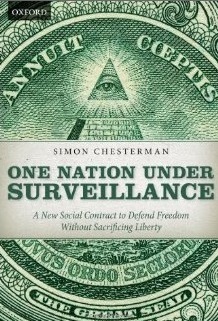 Simon Chesterman’s One Nation Under Surveillance: A New Social Contract to Defend Freedom Without Sacrificing Liberty, concerns itself with the ever increasing power of the state to pry on the lives and privacy of the individual.
Simon Chesterman’s One Nation Under Surveillance: A New Social Contract to Defend Freedom Without Sacrificing Liberty, concerns itself with the ever increasing power of the state to pry on the lives and privacy of the individual.
Chesterman devotes his book to outlining a new theory, or social contract, within which societies can balance enhanced security needs with the ever-increasing technologies that governments and intelligence agencies deploy, potentially dramatically undermining civil liberties through the uses of such technology.
Whilst the general thrust of the book is theoretical, Chesterman offers a central section on ‘practice’ in which he notes the developments of security and intelligence within the UK, USA and regarding the United Nations – each as a dedicated chapter. The chapter on the United Nations is particularly interesting and the section as a whole represents an interesting attempt to broach theory and practice together, avoiding any risk of the text becoming overly abstract.
This is a unique work that will make for a thought-provoking addition to the reading list of any student doing political theory or international relations theory. It will be of particular interest to those students looking for a new theoretical perspective on civil rights and the Big Brother state in the post 9/11 era.
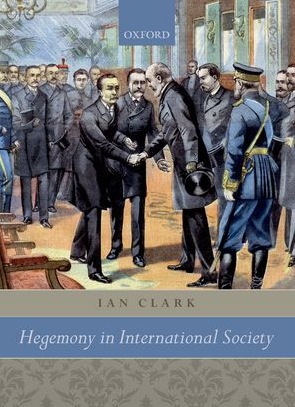 Carrying the theoretical torch yet further, Ian Clark’s Hegemony in International Society is a modern approach which attempts to decouple the idea of hegemony by isolating and analysing it on its own merits. Clark asks whether hegemony as a concept should be dismissed, or downgraded, or perhaps reconstituted. The book is extremely well structured, and after locating and explaining its theoretical base, selectively examines perceptions of hegemony in history – from 1815 through to the Cold War years – before finally examining the idea of hegemony in the contemporary world.
Carrying the theoretical torch yet further, Ian Clark’s Hegemony in International Society is a modern approach which attempts to decouple the idea of hegemony by isolating and analysing it on its own merits. Clark asks whether hegemony as a concept should be dismissed, or downgraded, or perhaps reconstituted. The book is extremely well structured, and after locating and explaining its theoretical base, selectively examines perceptions of hegemony in history – from 1815 through to the Cold War years – before finally examining the idea of hegemony in the contemporary world.
Whilst analysis of America is unavoidable in a modern work on hegemony, Clark avoids an overly US centric analysis, true to the outwardly stated English School nature of this book. Accounting for the prime role America has played in recent international history through his various sections on world history, Clark moves on to question the very legitimacy of America’s role in the post Cold War structure, rather than taking American preponderance as a given – which is fully in line with the theoretical bedrock of the book. The issue of whether America can truly fulfil a leadership role, which meets the expectations of the international society of nations, is therefore a current that runs throughout the analysis.
Clark’s book is much more clearly aimed at international relations scholars and students than any of the other texts in this feature, and will be a challenging read for those without a background in the discipline. But with that in mind, any student studying the idea of hegemony, and wishing to gain from a contemporary English School viewpoint, will find considerable value in Clark’s book.
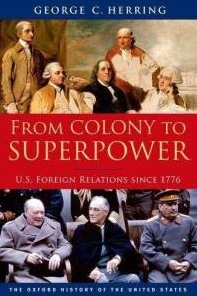 For all students interested in America’s role in international politics the history of its rise to hegemony in the 21st Century is essential reading. Covering that history in a single volume is a big ask, but as a researcher who deals predominantly with American foreign policy myself, and also as a diplomatic history enthusiast, I have found no better catch-all volume on American foreign relations than George C. Herring’s From Colony to Superpower: U.S. Foreign Relations Since 1776.
For all students interested in America’s role in international politics the history of its rise to hegemony in the 21st Century is essential reading. Covering that history in a single volume is a big ask, but as a researcher who deals predominantly with American foreign policy myself, and also as a diplomatic history enthusiast, I have found no better catch-all volume on American foreign relations than George C. Herring’s From Colony to Superpower: U.S. Foreign Relations Since 1776.
The book does exactly what it promises offering 1000 pages of engaging history reaching from 1776 to 2007. The structure and sectioning of the book based on chronology allows for selective reading as required, so, if you have an assignment on Nixon, for example, you can simply snap to the appropriate sub-chapter and find a useful starting point for your research. Herring’s work will give you a good road map and awareness of the major issues throughout US history, providing an excellent platform from which you can take your research forward. The book does somewhat lacks a major overarching theme or underlying framework wedding the vast chronology together (which some readers might actually welcome). Yet, this is not a pedestrian reading of history, and readers can expect frequent analysis throughout.
Whilst advanced students of American politics and history may find that the book covers familiar territory, it will without doubt be a rich resource for undergraduate students due to its breadth. This highly readable text is particularly recommended for students of international relations who will find it provides key historical context often missed in contemporary and theoretical analyses.
Further Reading on E-International Relations
- Student Feature – Theory in Action: Towards a Global IR?
- Thinking Global Podcast – The Laid-Back Book Club (Ep.2.)
- A Comprehensive Introduction to International Relations and IR Theory
- Thinking Global Podcast – The Laid-Back Book Club (Ep.1.)
- Student Feature – Advice on Using Theory in Academic Work
- Student Feature – Theory in Action: ‘Isms’ Are Evil. All Hail the ‘Isms’!